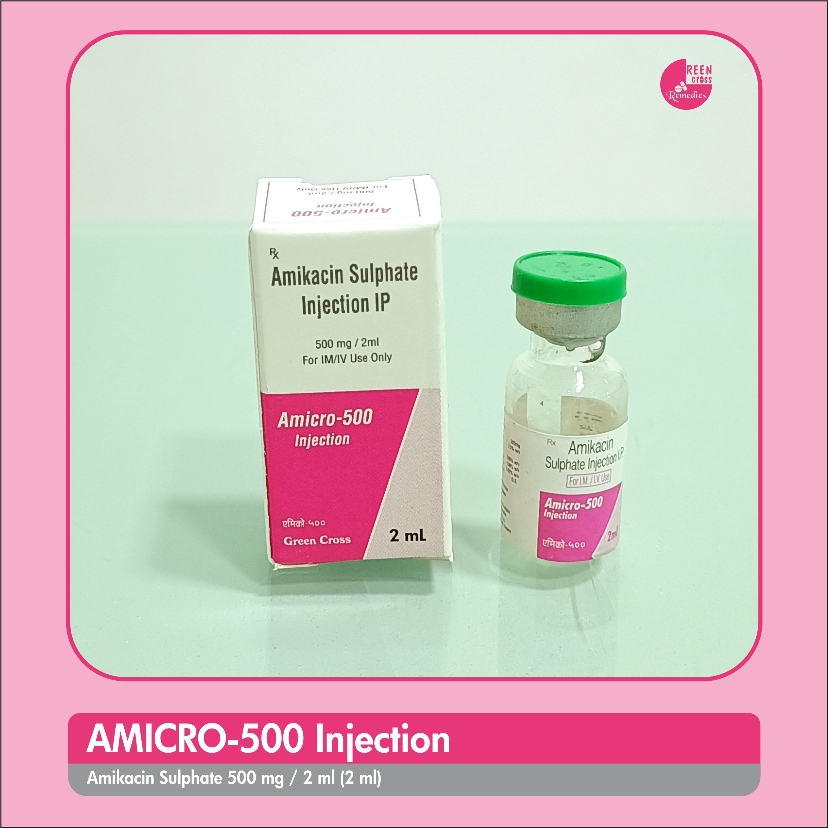AMICRO 500 Injection
Amikacin Sulphate 500 mg / 2 ml Injection.Use, Indication, Side Effects, Dosage, Mechanism of Action, Price, Contra-Indications, Drug Interactions As Description|MRP: (2 ml)
Inquiry Now
Amikacin Sulphate 500 mg / 2 ml Injection.Use, Indication, Side Effects, Dosage, Mechanism of Action, Price, Contra-Indications, Drug Interactions....
AMICRO 500 Injections
An Aminoglycoside Effective against Severe Hospital Acquired Infections.
Established Potency to Cure Gram –Ve and +Ve Infections.
Effective against a variety of aerobic gram – negative bacilli including those that are resistant to gentamicin and other amino glycosides.
Composition:
Amikacin Sulphate 500 mg / 2 ml (2 ml) Injection.
Use/Indication:
AMICRO 500 Injection is primarily used to treat serious bacterial infections caused by organisms susceptible to amikacin. It is commonly prescribed for:
- Respiratory infections (e.g., pneumonia, bronchitis).
- Urinary tract infections (e.g., cystitis, pyelonephritis).
- Bloodstream infections (e.g., sepsis).
- Soft tissue infections (e.g., abscesses, cellulitis).
- Intra-abdominal infections (e.g., peritonitis).
- Bone and joint infections (e.g., osteomyelitis).
- Meningitis and endocarditis in certain cases.
Side Effects:
Common and serious side effects associated with AMICRO 500 include:
- Nephrotoxicity (kidney damage): Increased risk of kidney-related issues, especially with prolonged or high-dose use.
- Ototoxicity (hearing loss or balance problems): Damage to the inner ear can occur, leading to hearing loss, tinnitus, or vertigo.
- Allergic reactions: Rash, itching, swelling, or more severe anaphylactic reactions.
- Gastrointestinal issues: Nausea, vomiting, diarrhea, or abdominal discomfort.
- Injection site reactions: Pain, redness, or swelling at the injection site.
- Elevated liver enzymes: In rare cases, liver function abnormalities.
Dosage:
The typical dosing for AMICRO 500 Injection is determined by the severity of the infection, the patient's age, weight, kidney function, and the susceptibility of the causative bacteria. However, a general guideline is:
- Adults: 15 mg/kg body weight per day, given in divided doses (usually 1–2 times daily).
- Pediatric patients: 15 mg/kg body weight per day (dosed in divided doses).
- Renal impairment: Dose adjustments may be necessary in patients with kidney disease, as amikacin is primarily excreted via the kidneys.
Mechanism of Action:
Amikacin is an aminoglycoside antibiotic that works by inhibiting bacterial protein synthesis. It binds to the 30S ribosomal subunit of susceptible bacteria, causing misreading of mRNA and disrupting protein synthesis, which ultimately leads to bacterial cell death. It has a bactericidal effect on a wide range of Gram-negative and Gram-positive bacteria.
Contra-Indications:
AMICRO 500 Injection should be used with caution or avoided in the following cases:
- Hypersensitivity to amikacin or other aminoglycoside antibiotics.
- Pre-existing kidney disease or impaired renal function (unless carefully monitored).
- Myasthenia Gravis: Use with caution in patients with neuromuscular disorders.
- Pregnancy and breastfeeding: Should be used only when absolutely necessary, and only if the benefits outweigh the risks. Amikacin may cross the placenta and be excreted in breast milk.
Drug Interactions:
- Other nephrotoxic drugs: Concurrent use with other nephrotoxic agents (e.g., non-steroidal anti-inflammatory drugs, diuretics, or other antibiotics) increases the risk of kidney damage.
- Ototoxic drugs: Combining amikacin with other ototoxic medications (e.g., loop diuretics like furosemide) can enhance the risk of hearing loss or balance issues.
- Muscle relaxants: Amikacin may potentiate the effect of non-depolarizing muscle relaxants, leading to prolonged muscle paralysis.
- Anesthetics: Concurrent use with anesthetics may increase the risk of neuromuscular blockade and respiratory depression.
- Penicillins: May reduce the bactericidal effect of amikacin when used together, although this is more of a theoretical interaction.
Precautions:
- Kidney Function Monitoring: Regular monitoring of renal function (e.g., serum creatinine, BUN) is essential during treatment, especially in patients with pre-existing kidney conditions or those receiving prolonged therapy.
- Hearing Monitoring: Audiological tests should be performed in patients who receive prolonged or high-dose amikacin therapy to detect early signs of ototoxicity.
- Hydration: Ensure adequate hydration to reduce the risk of kidney damage.
Note: Always follow the prescribing doctor's instructions and seek medical advice before initiating therapy, especially for people with pre-existing health conditions.
Packaging :
2 ml Pack With Mono Carton.
For Use of registered medical practitioner or a hospital only
GREEN CROSS REMEDIES hat is amikacin used to treat,How long does it take for amikacin to work,How do you give amikacin IV injection,Does amikacin

